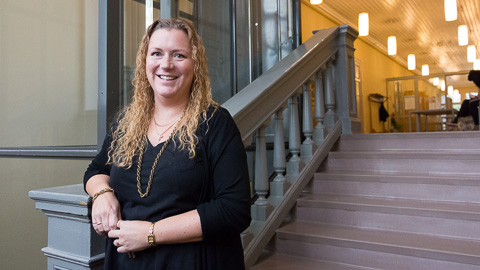Foreign Language Is Learnt by Listening
Learners of a new language should approach the foreign words by listening, as it facilitates the acquisition of correct articulation. Seeing the words in written form instead hinders the learning of speech sounds.

The learning of the sounds of foreign languages has traditionally relied on a combination of listening and repetition. However, the preliminary results of a research project on the acquisition of articulation, conducted by the University of Turku researchers in phonetics, suggest that even the mere listening of a foreign language develops articulation.
– Listening seems to have clear benefits in terms of learning speech. The young speak English really well nowadays. One influencing factor is surely the fact that they consume English-language culture when playing online games, for instance, states Docent Maija S. Peltola from the Department of Phonetics.
The Elderly Draw on Experience When Learning a New Language
When examining the ability of people of different ages to learn foreign sounds, the researchers of phonetics were surprised at how quickly the 60–70-year-olds were able to acquire a new language. The researchers had hypothesised that the learning ability of the elderly would be lower but instead it turned out that the elderly can learn a new language even more quickly than children aged from 7 to 11 years.
– The preliminary results suggest that seniors drew on previous experiences in learning a new language, which improved learning results. This is a great result, as the ability to learn quickly shows that even the slightly more aged have what it takes to cope in new situations, says Peltola.
When learning the sounds of a foreign language, elementary school pupils adapt to the new situation quickly and follow instructions carefully. Adults aged from 18 to 40, on the other hand, are already capable of drawing on their life experience, but they can also easily adapt to new situations.
– Young adults are like machines and they learn everything in an instant. They are able to utilise all means, which makes them quick learners, says Peltola.
Language Laboratories across the World
The University of Turku researchers of phonetics have cooperated with researchers in universities in Barcelona and London, which has enabled a comparative study between different languages. The native speakers of English, Spanish and Finnish have at least one thing in common – the tendency to forget familiar sounds if they encounter something foreign.
– If the words contain foreign sounds, they are pronounced in an exaggeratingly strange way, and one becomes unable to produce even sounds that are actually familiar.
International cooperation networks become wider and wider, as the Department of Phonetics will be renewing a contract with Sanako, which is a producer of devices used in language teaching. The devices provided by the company enable researchers to establish language laboratories around the world.
– The contract launches what one might call a project to conquer the world. I would like to establish laboratories at least in Malaysia and China. It would also be interesting to study the Spanish and English speakers in California, for instance, and the French and English speakers in Montreal. This is how we would be able to compare bilinguals of different languages, reflects Peltola.
Text: Jenni Valta
Front page photo: PublicDomainPictures
Translation: Aino Koivisto